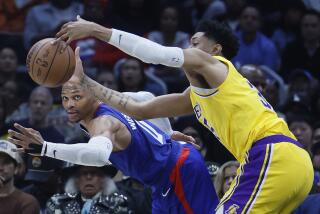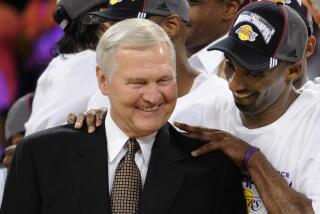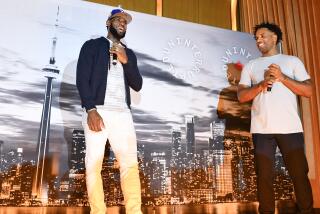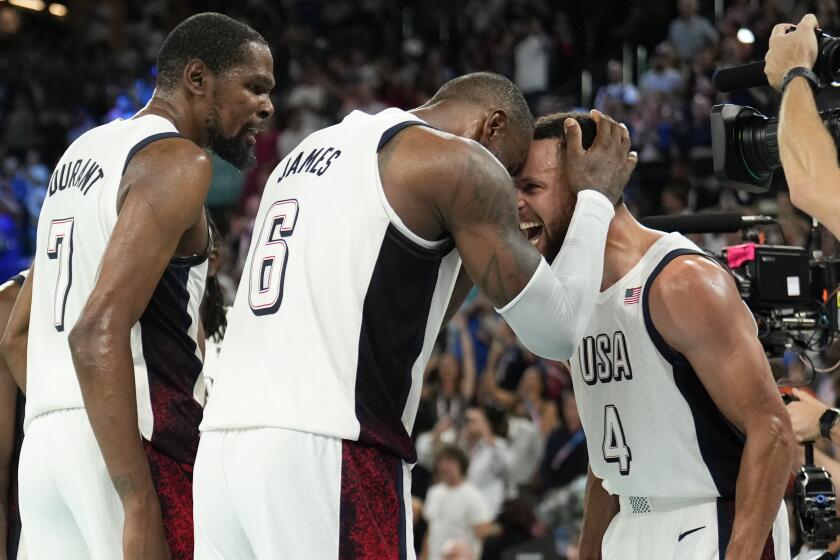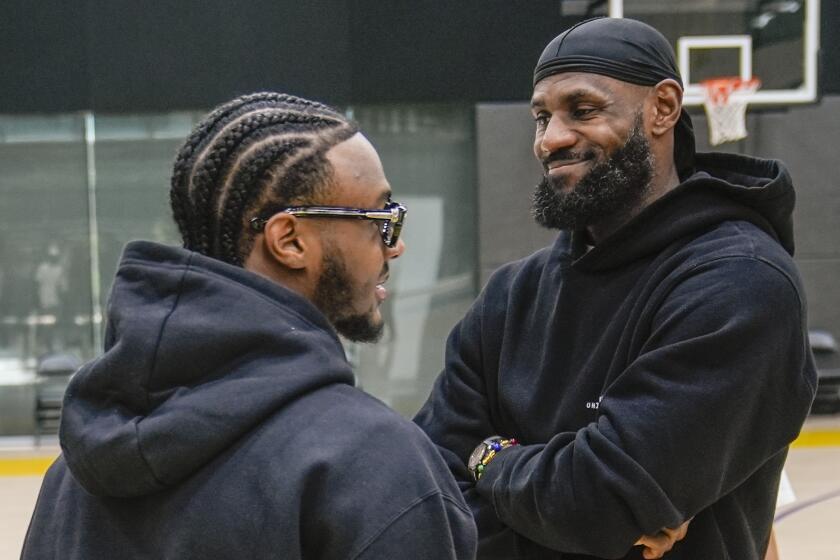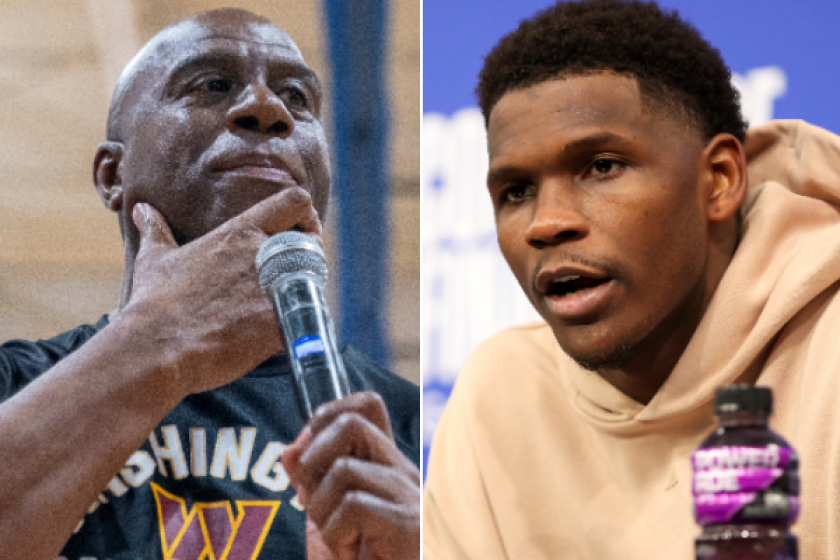Playing the Race Card Is a Bad Deal by Wallace
The boos came down hard and authoritatively when Rasheed Wallace’s name was announced, for the moment disproving yet another part of Wallace’s now-infamous interview.
“I ain’t worried about that,” Wallace said. “That [stuff] don’t affect me. I still go out there and play. Just because they’re raining the boos, that don’t stop me from playing.”
Didn’t stop him from scoring 28 points in a Trail Blazer victory over the Lakers, either.
Not that anyone bothered to read the part of the interview in Thursday’s Oregonian where he said “50% of [the fans] love you, 50% hate you no matter what you do.” Most people probably didn’t even get to the core of Wallace’s controversial statements regarding the NBA’s relationship with its players because he injected race into the formula, and race still trumps everything else in this country.
Wallace said: “I ain’t no dumb .... I’m not like a bunch of these young boys out here who get caught up and captivated into the league. No. I see behind the lines. I see behind the false screens. I know what the business is all about. I know the commissioner of this league makes more than three-quarters of the players in this league.
“In my opinion, they just want to draft ... who are dumb and dumber -- straight out of high school. That’s why they’re drafting all these high school cats, because they come into the league and they don’t know no better. They don’t know no better and they don’t know the real business and they don’t see behind the charade. They look at black athletes like we’re dumb.... It’s as if we’re going to shut up, sign for the money and do what they tell us.”
Wallace repeatedly used the racial pejorative. Blame the co-opting of that word and then the continued overuse of it in hip-hop songs by the African American community for its constant appearance in casual conversation. Wallace even used it as though it was just another noun in a lively talk about boxing with his teammates before they played the Lakers.
But blame Wallace for unfairly assigning that attitude to owners around the league without discretion. And blame him for the misguided notion that the league seeks out high school players, when Stern is the one in favor of a 20-year age minimum for the NBA while prep stars and their agents flock to the money.
Stern issued a statement in which he said, “Mr. Wallace’s hateful diatribe was ignorant and offensive to all NBA players.” But he left any punitive action up to the Trail Blazers and their fans. As he should.
As Stern said, the comments weren’t directed to any individuals other than Stern himself, and he did not demean any race.
Wallace issued a statement in which he apologized and said “I regret using street language to express my opinion because everyone has focused on these few comments when I said other things. It was not my intent to offend anyone.”
Wallace’s initial statements were so radioactive that no other players wanted to touch them. Oh, they all talked about them. In the Laker locker room before Friday’s game against the Dallas Mavericks several players disappeared into the trainer’s room to read a copy of the interview. But none of them wanted to address it on the record.
Same thing for Wallace’s Portland teammates. And when Trail Blazer Coach Maurice Cheeks was asked about it Saturday morning, his response was something to the effect of “Uhh, idonuh, ahh, hmmm.” And then he walked away, waving his hands.
There is a serious issue here, the notion of class separatism. As rich as the players are, the owners are even richer. Race inevitably creeps into the discussion in a league in which the vast majority of players are African American -- but the only minority owner is the expansion Charlotte Bobcats’ Robert Johnson.
It’s the players who have the short career life spans, who can be sent packing to another city without warning. The Chicago Bulls sold out 610 consecutive games from 1987 to 2000, building a new luxury suite-packed arena in the process, thanks primarily to Michael Jordan. Yet when he signed a $30 million contract in 1996, Bull owner Jerry Reinsdorf irked him by suggesting this long-overdue reward was actually a sign of weakness on Reinsdorf’s part.
Laker Coach Phil Jackson took on this issue and gave it much-needed perspective.
“Players have always felt used in some commodity,” Jackson said. “It’s such an irrational [statement] to even say when a kid makes $17 million in a season to play basketball [as Wallace does].
“But it’s something beyond the money for the way the kids feel about the oppression in the league. They [the powers that be] use a clout a lot of time for the players that’s difficult for the players to swallow.
“All of the players since I’ve been a player [in the 1970s] have railed against authority. It’s also part of the character of an athlete to do that. It hasn’t changed.
“We were making an average salary of $20,000 a year when I was playing, not $20 million. At the time it was still double what a teacher was making in school, but by and large, people were saying, ‘You’ve got a great job. This is a great opportunity.’ It’s not about the money, it’s about the little things that go along with the job that I think sometimes get to players.
To clarify, Jackson said he held the same belief that owners disrespected players. But where Wallace lost Jackson and lost any footing in the high ground was when he made it a matter of race.
Despite Wallace’s reputation as a marijuana-smoking, technical foul-receiving maniac, players around the league have always liked his game. Jackson even expressed some fondness for Wallace, even though Wallace was among those whose misdeeds once prompted Jackson to wonder how the good people of Portland could support this team. At a time when NBA players were picking up reputations as deadbeat dads, Wallace was actually fighting to gain custody of his oldest child.
But, apparently, all the fans want to see is production on the court. When a Wallace jump shot bounced in with 25 seconds remaining to secure the Blazer victory, the fans at the Rose Garden stood on their feet and cheered. I’d say that made it 50-50.
Maybe there was just a kernel of truth in Wallace’s statements after all.
*
J.A. Adande can be reached at j.a.adand@latimes.com
More to Read
All things Lakers, all the time.
Get all the Lakers news you need in Dan Woike's weekly newsletter.
You may occasionally receive promotional content from the Los Angeles Times.
